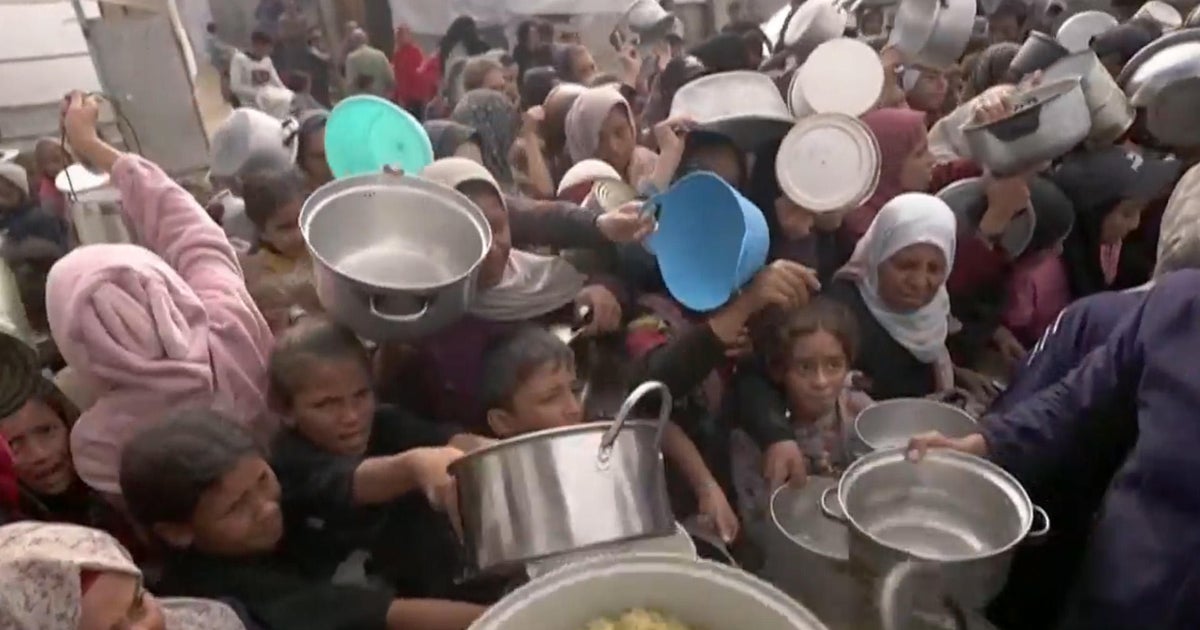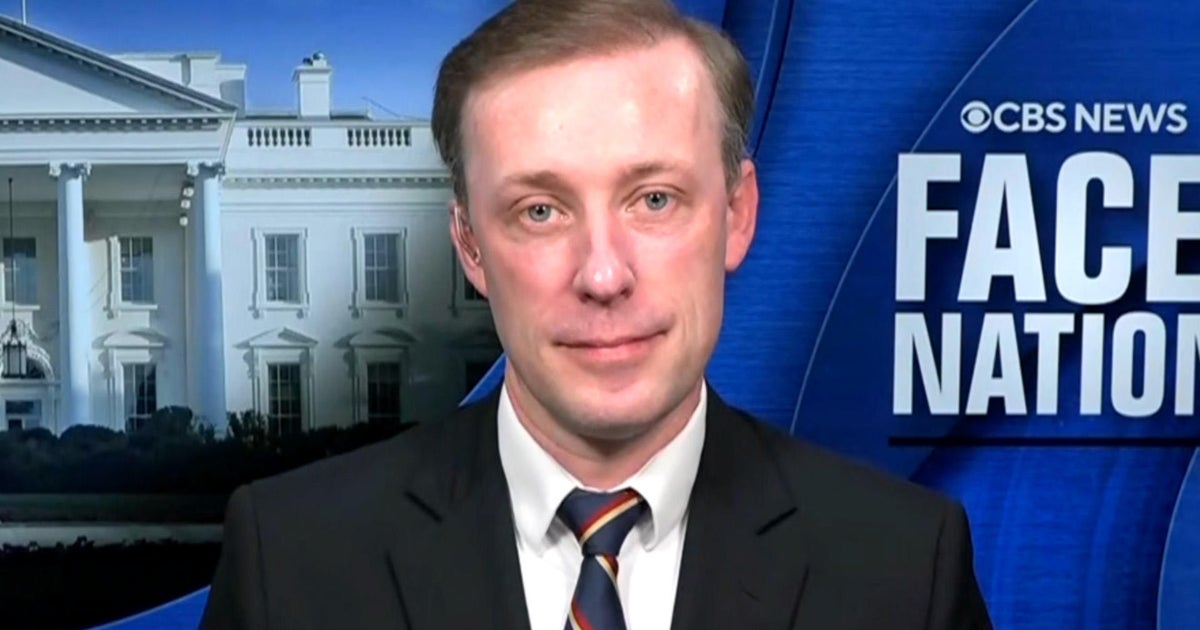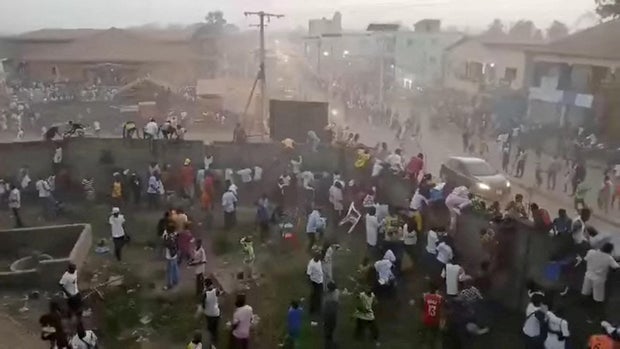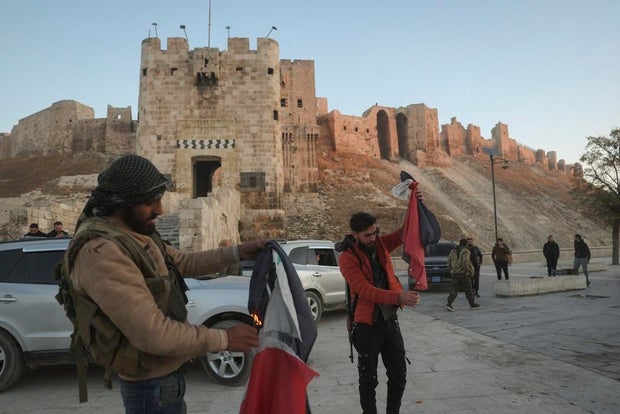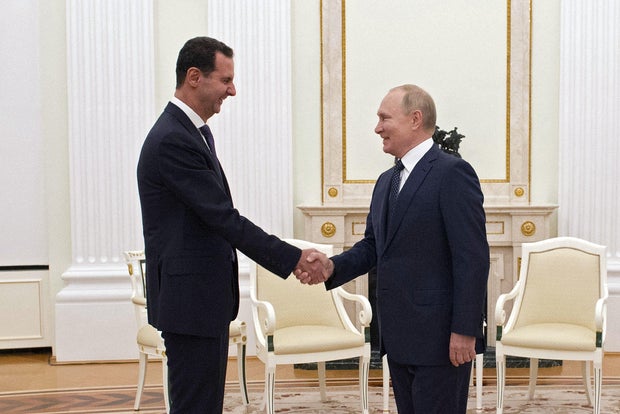CBS News
Israeli strike hits humanitarian workers in Gaza as Hamas releases progaganda video of hostage

Watch CBS News
Be the first to know
Get browser notifications for breaking news, live events, and exclusive reporting.
CBS News
President Biden issues sweeping parson for son Hunter Biden

Watch CBS News
Be the first to know
Get browser notifications for breaking news, live events, and exclusive reporting.
CBS News
Soccer stadium stampede in Guinea kills at least 56 people, officials say, including several children

Conakry, Guinea — Fifty-six people were killed and several injured in a stampede at a soccer stadium in southern Guinea following clashes between fans, the military government of the West African nation said Monday. Authorities were conducting an investigation to establish who was responsible for the stampede on Sunday, Communications Minister Fana Soumah said in a statement read on national television.
Several children were among the victims, according to local media and a coalition of political parties.
The stampede broke out Sunday afternoon at the stadium in the city of Nzerekore during the final of a local tournament between the Labe and Nzerekore teams in honor of Guinea’s military leader, Mamadi Doumbouya, Guinea’s Prime Minister Amadou Oury Bah said on social media.
Social media/Reuters
“During the stampede, victims were recorded,” Bah said, without giving details. Regional authorities were working to restore calm in the area, he added.
Local media reported security forces had tried to use tear gas to restore calm after the chaos that followed a disputed penalty.
“This (the disputed penalty) angered supporters who threw stones. This is how the security services used tear gas,” Media Guinea, a local news website, reported. It said several of those killed were children while some of the injured being treated at a regional hospital were in critical condition.
Videos that appeared to be from the scene showed fans in a section of the stadium shouting and protesting the refereeing before clashes broke out as people poured onto the field. People ran to try to escape from the stadium, many of them jumping a high fence.
Other Videos showed many people lying on the floor in what looked like a hospital, as a crowd gathered nearby, some assisting the wounded.
An opposition political coalition known as the National Alliance for Alternation and Democracy called for an investigation. It said the tournament had been organized to drum up support for the “illegal and inappropriate” political ambitions of the country’s military leader.
Guinea has been led by the military since soldiers ousted President Alpha Conde in 2021. It is one of a growing number of West African countries, including Mali, Niger and Burkina Faso, where the military has taken power and delayed a return to civilian rule across a region that’s become known as Africa’s Coup Belt.
Doumbouya, who ousted the president three years ago, said he was preventing the country from slipping into chaos and chastized the previous government for broken promises. He has, however, been criticized for not meeting the expectations he raised.
CBS News
Syria’s civil war reignites in dramatic fashion as Russia joins airstrikes on rebels who seized Aleppo

The Syrian military and its ally Russia conducted deadly joint air raids Monday on areas that Islamist-led rebels seized control of over the weekend. The strikes were a response to a lightning offensive by the rebels that saw them wrest control of swathes of northwest Syria from government forces.
The conflict that started more than a decade ago took a significant turn several days ago, catching many — including, it seems, Syrian dictator Bashar Assad and his Russian backers — by surprise. On Saturday, rebels, including many with the U.S.-designated Islamic terrorist group Hayat Tahrir Al-Sham (HTS), took control of the major city of Aleppo in northern Syria.
The rebels seized Aleppo’s airport and started pushing into towns and villages in the countryside around the city on Sunday after leaving piles of dead government soldiers in the streets. Observers said the rebel forces were often met with little to no resistance by regime forces, but by Monday the pace of the surprise offensive appeared to have slowed, with Assad and his Russian backers ramping-up their response.
Syrian rebels’ surprise offensive
Syria’s civil war began in 2011 after civilians led pro-democracy protests against Assad, and his government responded by opening fire on its own people. The ensuing war is thought to have killed around 500,000 people but, for the last several years, it had simmered as a stalemate. Government forces have controlled the west and south of the country, American-backed rebels have dominated the northeast, and Islamist rebel factions — including the ones now in control of Aleppo — have held most of the northwest.
“We are coming Damascus,” the rebels chanted Sunday, threatening to push on next toward Syria’s national capital and the Assad government’s stronghold.
Ghaith Alsayed/AP
The balance in the stalemate started changing last week, when the Islamist-led rebel alliance in the northwest launched its offensive. Over the weekend, HTS and allied factions took control of Aleppo city for the first time since the civil war started more than a decade ago, according to the Syrian Observatory for Human Rights war monitoring group’s director Rami Abdel Rahman.
Aleppo, an ancient city dominated by its landmark citadel, is home to two million people. It was the scene of fierce battles earlier in the conflict but, until Sunday, the rebels had never managed to totally seize it. Video showed rebels in military fatigues patrolling the streets of Aleppo, with some setting fire to a Syrian flag and others holding up the green, red, black and white flag of the revolution.
While the streets appeared mostly empty, some residents came out to cheer the advancing rebel fighters. HTS is an alliance led by al Qaeda’s former Syria branch. It’s fighting alongside allied factions, with units taking orders from a joint command.
Aron Lund of the Century International think tank said: “Aleppo seems to be lost for the regime.”
He added: “And a government without Aleppo is not really a functional government of Syria.”
The United States and its allies France, Germany and Britain called Sunday for “de-escalation” in Syria, and for the protection of civilians and infrastructure. The U.S. maintains hundreds of troops in northeast Syria as part of an anti-jihadist coalition, and it has also continued carrying out strikes against Islamist groups in the country.
Russia and Iran vow to help Syria’s Assad
Assad’s reaction to the surprise offensive was still building on Monday with the joint airstrikes carried out by his air force and his Russian allies, and expanded ground operations aimed at retaking towns and villages north of Aleppo said to be underway.
ABDULAZIZ KETAZ/AFP/Getty
Syrian-Russian air raids hammered several areas of both Aleppo and the neighboring Idlib provinces, killing at least 49 people, including 17 civilians, according to the Observatory.
“The strikes targeted… displaced families living on the edge of a displacement camp,” said Hussein Ahmed Khudur, a 45-year-old teacher who sought refuge at a camp in Idlib after fleeing fighting in Aleppo province. He said one of the five people killed in one strike was a student of his, and the other four were his four sisters.
Russia, which first intervened directly in the Syrian war in 2015, said Monday that it continued to support Assad.
MIKHAIL KLIMENTYEV/SPUTNIK/AFP/Getty
“We of course continue to support Bashar al-Assad and we continue contacts at the appropriate levels, we are analyzing the situation,” Kremlin spokesman Dmitry Peskov told journalists.
Iran’s top diplomat Abbas Araghchi, was in Syria on Sunday to deliver a message of support, state media said.
On Monday, Iranian foreign ministry spokesman Esmail Baqaei said the Islamic republic had entered Syria at the official invitation of Assad’s government.
“Our military advisers were present in Syria, and they are still present. The presence of advisers from the Islamic Republic of Iran in Syria is not a new thing,” he said.
Same Syrian civil war, but very different times
While the fighting is rooted in a war that began more than a decade ago, much has changed since then. Millions of Syrians have become displaced, with around 5.5 million living in neighboring countries.
Most of those involved in the initial anti-Assad protests are either dead, living in exile or in jail.
Russia, meanwhile, is nearing the third year of its incredibly costly full-scale war on Ukraine, and Iran’s militant allies Hezbollah and Hamas have been massively weakened by more than a year of conflict with Israel.
On Monday, Iran’s foreign ministry said it would maintain its military support for the Syrian government.
But the role of Lebanon’s Hezbollah, which played a key role in backing the government particularly around Aleppo, remains in question particularly after it withdrew from several of its positions to focus on fighting Israel.
HTS and its allies began their offensive Wednesday, just as a ceasefire took effect in Lebanon after more than a year of war between Hezbollah and Israel.
The recent violence in Syria has killed some 244 rebels and 141 Syrian regime and allied fighters, along with at least 24 civilians, according to the Observatory, which has a network of sources inside Syria. The Observatory said rebel advances met little resistance.
Aaron Stein, president of the U.S.-based Foreign Policy Research Institute, said “Russia’s presence has thinned out considerably and quick reaction airstrikes have limited utility.”
He called the rebel advance “a reminder of how weak the [Assad] regime is.”
The airstrikes on Sunday on parts of Aleppo were the first since 2016.
and
contributed to this report.


